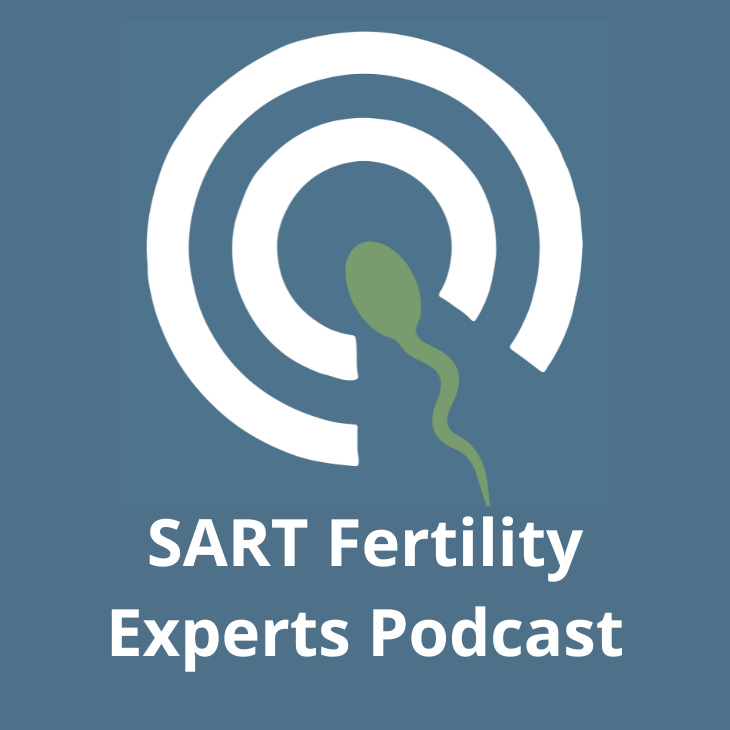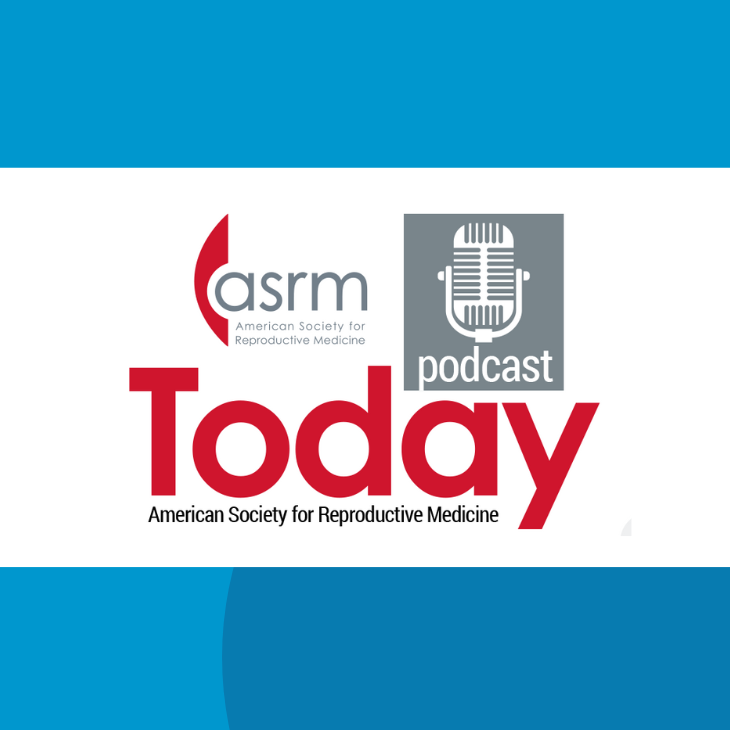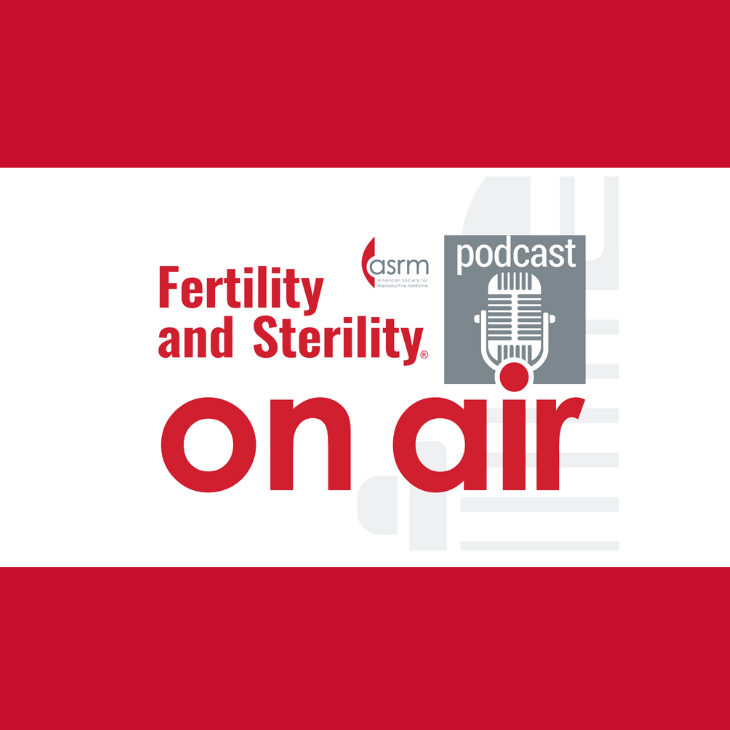
Transcript
The information and opinions expressed in this podcast do not necessarily reflect those of ASRM and SART. These podcasts are provided as a source of general information and are not a substitute for consultation with a physician. Welcome to SART Fertility Experts, a podcast that brings you discussions on important topics for people trying to build a family.
Our experts are members of SART, the Society for Assisted Reproductive Technology, an organization dedicated to ensuring you receive quality fertility care. Welcome to today's SART podcast. Today, we're going to talk about egg or ovum donation.
It's a wonderful way to build families, and I'm lucky enough to have Yuki, who's an intended mother, who's gone through this process, and she's been gracious enough to share her personal objective feelings on this. Egg donation is a great way to start families, and often women who are 43 and above will go straight to egg donation. There are also many families that choose this option because of decreased ovarian reserve or decreased egg or embryo quality.
We also have single male parents who use egg donation as a way to start their family and gay intended fathers. Thank you, Yuki, and I'd like to ask you a couple questions. Initially, you can let us know a little bit about the age of your children and about the journey or the process that you took to get to that point.
Sure. Hi. Today, my name is Yuki, and I have two beautiful children from egg donation.
Our son is four and a half years old, and our daughter will be 12 months next week. So kind of a little bit of a background of how I got to the point of using an egg donor. I, myself, went through infertility issues for about seven years and went through IVF, a total of seven times, so seven IVF cycles.
And out of those seven IVF cycles, I think the best that I ever got was six eggs. And so out of all the times that I did transfers from those IVF cycles and embryos generated, I had two biochemical pregnancies and one pregnancy that I carried to nine weeks and then miscarried. A lot of, you know, the doctor was telling me is most likely the reasons why I had such difficulties is both a combination with low ovarian reserve as well as age issues.
I believe we started trying when I was, I think, around mid-30s. And so I think a combination of chromosomal abnormalities as well as low ovarian reserve was a lot of the fertility issues that I had. And so by the time that we got to my seventh IVF cycle, I think I was producing one follicle, and I was quoted that our chances of having a child that was 100% genetically related, 100% genetically ours was probably less than 3%.
So my husband and I really had to come to terms with what our options were. And at the time for us personally, we drew a hard line at, we did not want to do any adoption just because we had heard some stories of adoption being, you know, having a lot of hardship. So we kind of turned towards the option of doing donor egg.
And for me, you know, I think personally, it was very hard. I'm a scientist by training. So I think in a lot of ways, it was hard for me to kind of wrap my head around having a child that was not 100% genetically ours.
But at the end of the day, the most important thing that my husband and I decided was that we wanted to be parents and that we wanted to have a family. And so we set out to find an egg donor that we felt was a great match for us. Yeah, I see parents who've gone through embryo donation, egg donation, and they're holding that baby and the baby smiles and they hug each other.
And there's no doubt in my mind that there is a lack of love or anything but true family and love and just nice relationships. So there's no question in my mind. Sometimes patients will ask me and they'll say, do you think that I'll be happy? I'll love this child.
And I say, I have no doubt. And it's obviously something that every person's got to process and go through. But I see the end result and the hair is standing up on my arms because it's just, it's beautiful and it's true love.
So I know when you're picking an egg donor, how was that process for you? Was it easy? Was it hard? And how did you pick your egg donor? So initially for me in this, I think that picking the egg donor is a very personal process and it's going to be different for every, every person going through the choice. And really for me, the biggest, one of the biggest kind of criteria I think for me was the fact that I am of Japanese origin. I'm Japanese first generation.
And in order to feel like I had a link or a connection or bond to the, to the children, you know, I wanted to make sure that the egg donor was at least part Japanese. She didn't have to be full Japanese, but at least part Japanese, just so I felt like I had that connection with, with the kids. And so we were very, very lucky and fortunate to come across a donor who was a quarter Japanese.
And we just kind of fell in love with her profile, even though she wasn't, you know, half or full Japanese, you know, just the fact of like the fact that she was quarter Japanese and then, you know, reading the rest of her profile, like I said, we just kind of fell in love with her. And some of the aspects that we that kind of why we gravitated towards her was, you know, she was interested in the scientist, you know, in the sciences. I'm a scientist.
She seemed very quirky. I'm a pretty, have a pretty quirky sense of humor. And she, he just seemed very, and she was also like athletic into sports.
And, and she just seemed like a really compassionate person in the way that she addressed the questions of why she wanted to be an egg donor. And so I think even though it was an anonymous process with choosing an egg donor, we just kind of fell in love with her profile. And, and again, the way that it really started was having the genetics of having, you know, a Japanese background was pretty important for me.
Yeah, I've read our egg donor profiles and the donors do take to heart. These are special women that want to give life to others. And, and in, when I've read the profiles there, I just, I do want to meet these egg donors and I can see how a lot of the intended parents, when, when they read the profile that they say, this is the one.
So, and we, we do, we're very, I think we've got women that are very beautiful on the inside and out, and we'd match people very well, personality wise and, and, you know, physically also. But I think that these profiles are very telling. Part of the process when you're going through the egg donor processes is that you meet with a rebirth psychologist.
And it's not that we think there's anything psychologically wrong. People that want to have children, they, they have their stuff together. They're giving and they're wanting to provide life and love and family.
When you had your reproductive psychology consultation, what information did you gain from that? You know, I found that it was pretty helpful in that. So I will mention that my husband and I are very familiar with the reproductive endocrinology field. I used to work as an embryologist and my husband is actually a fertility doctor.
And so even though we knew probably what to expect from the consultation and, you know, kind of the type of questions that were going to be asked of us, it was still nice for us to kind of go through that just because I think it gave us a very objective point of view from somebody that does this for everybody going through the egg donation process to really see if we were fit with thinking about the questions of what it meant to use an egg donor. So I really appreciated it. In fact, even though I kind of knew what to expect going in and just kind of hear their point of view that, you know, they thought that we had, you know, really seen this whole process through and we're very critical of, you know, what we're doing and making sure that we're doing it for the right reasons.
And so in that regard, it was, it was very helpful. And I think they gave us a lot of tips on, you know, how to approach the timing of discussing egg donation with the children and just kind of like having a healthy perspective on the whole, whole situation. Yeah, that's really, it's great insight to see that you've seen all sides of this from, you know, the scientific side, from the medical side, from the emotional side, and you know all about this and that this has still turned out to be a wonderful option for you and something that you really are appreciative of.
And it really has been, yeah. And you were mentioned about, you know, telling your child about your egg donor and what age do you plan to tell your children about their egg donor? So in fact, our son is already, he's four and a half, so he's still pretty young. Our youngest one is still almost not quite a year old, so she's definitely too young.
But, you know, with our four and a half year old, we've already, you know, brought it up a couple times. I don't know how much he truly understands it, but we've brought it, brought up the, you know, the concept of using an egg donor. And, you know, I think it's just going to be a discussion, you know, in progress over time.
And as he gets older and understands more, you know, we'll continue to have discussions about it. But with a hundred percent transparency, I mean, there's nothing that we're trying to hide from him. It's really just a matter of the timing of how much he's going to understand and how much information to throw at him at what age.
Yeah, kids are very accepting of the truth. I have seen these books that reproductive psychologists have written, and they're very good, and they're very appropriate for kids to process the whole, the egg donation process. And like I said, kids are very resilient and very accepting.
Would you recommend egg donor to others? Absolutely, I would. Absolutely, I would. I think that, you know, for our kids, you know, my husband and I couldn't love them any more than if they were a hundred percent are genetically ours.
And they're just such special people, you know, so any woman that has going through having, you know, ovarian reserve issue or any infertility reasons that you would have to go and go through using an egg donor, I would highly recommend it. My husband and I are so happy to have gone through the process. I a hundred percent agree.
This is a beautiful option. And I thank you, Yuki, for giving us your emotional objective perspective. And I hope this has helped intended parents for their processing and just knowing what a great option that we have to build families.
Thank you. Thank you for listening to SART Fertility Experts, your resource for information on IVF. If you found this podcast useful, please like us on your favorite social media platform and tell your friends about us.
For more family building resources, visit www.sart.org slash patient dash information or www.reproductivefacts.org.
For more information about the Society for Assisted Reproductive Technology, visit our website at https://www.sart.org
Have a topic you'd like to hear? Tell Us!
Subscribe to the SART Fertility Experts Podcast on iTunes, Spotify, Google Play, or your favorite Podcast catcher.
Visit the podcast website and Start With SART!
SART Fertility Experts is part of the ASRM Family of Podcasts. Subscribe Now so you don't miss an episode!
SART Fertility Experts Podcast
SART Fertility Experts is an educational project of the Society for Assisted Reproductive Technology, this series is designed to provide up to date information about a variety of topics related to fertility testing and treatment such as IVF.
SART Fertility Experts - Military Families and Fertility
Active-duty individuals in the military sometimes face unique circumstances when seeking fertility care. Learn more with a former military fertility physician.
SART Fertility Experts - Q&A on Infertility
Infertility can create many questions for a patient. Listen to common questions and answers about infertility, egg freezing, and genetic testing.
SART Fertility Experts - Vanquishing Multiples
Learn how a variety of factors such as geography, race, and the availability of comprehensive infertility mandates affect access to effective infertility treatment.
SART Fertility Experts - Global Access to IVF and the Status of Women
Around the world, there are vast differences in the number of IVF cycles performed per capita. Learn why these differences exist.Egg Donation
Find a Health Professional













